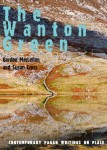The Wanton Green
by Creeping Toad & Susan Cross
Mandrake Books, Oxford, 2011
ISBN: 978 1 906958 29 9 Price: £10.99
I have known Creeping Toad/ Gordon MacLellan for a number of years. I met him first as a wonderful poet and storyteller. Then later as a practicing shaman. Many of his ideas and experiences also echo my own childhood in Lancashire. In this book he is the editor. In the press release one can read:
“From the lost magics and holy waters of London to bleak Staffordshire Moorlands; from childhood adventures in Rochdale to faeries in Devon and Cumbria, a new book, The Wanton Green, offers readers a different perspective on landscape As our relationship with the world unravels and needs to take new form, or maybe to reconnect with an older pattern, The Wanton
Green presents a collection of inspiring, provoking and engaging essays by modern pagans talking about their own deep and passionate relationships with the Earth. With contributions from twenty authors that range from Druids to Heathens, from Chaos Magicians to Witches, Shamans and Voudou Mambo, Wanton Green brings voices from the diverse and growing Pagan community of Britain to the environmental debate and promises food for thought and inspiration for the spirit.”
The Wanton Green is a collection of essays by some of the leading members of the British Pagan community exploring their own relationships with places. The project started with a challenge: how do we share that connection between pagan people and places, the richness that we experience, maybe the despair that we meet in a wider world.
With contributions from Emma Restall Orr, Runic John, Jan Fries and Susan Greenwood, The Wanton Green has gathered practitioners from a range of traditions. Witches, Heathens, Druids and Pagans are all represented here; and shamans, Voudou Mambo and magicians. “We didnʼt set out to be careful,” said Gordon MacLellan editor and agentprovocateur for the project, “with some precise balance of traditions to berepresented. We approached people we thought would write provocatively,moving beyond the usual interpretations of ‘sacred places’ or how a relationship with a world where landscapes are sacred evolves or manifests in daily life. What we got was far more than we expected or hoped for. Our authors have given us a set of essays that move from the deeply philosophical to the practical, with reflections on ancestors and heritage, pilgrimage, art and cityscapes. What unites this diversity is the personal nature of the writing. Our authors wrote about themselves. Emotional and revealing pieces exploring the connections that pagans experience with places.”
Contact Gordon at creepingtoad@btinternet.com.

